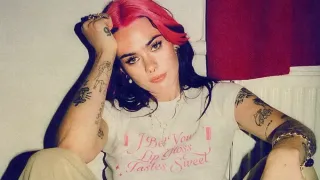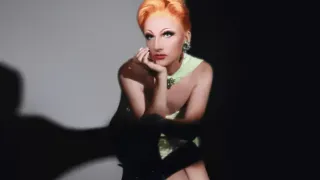
6 hours ago
Nathan Stewart-Jarrett Is Breaking the Mold: Black, Queer, and Unapologetically Himself
READ TIME: 4 MIN.
If you’re looking for a new queer icon who’s rewriting the script on Black and LGBTQ+ representation, Nathan Stewart-Jarrett is your man. With the poise of a leading man and the heart of an outsider, Stewart-Jarrett is making waves in British film and television—shattering stereotypes, embracing complexity, and refusing to be boxed in. His starring role in "Femme", a critically acclaimed thriller that premiered at the 2023 Berlin Film Festival, is just the latest proof that queer heroes can be messy, magnetic, and unforgettable .
It’s easy to forget, in the age of Drag Race and rainbow capitalism, that authentic queer stories—especially Black queer stories—are still hard to come by. Stewart-Jarrett is acutely aware of this. In "Femme", he plays Jules, a drag performer whose life is upended by a brutal homophobic attack. The story isn’t just about trauma, though—it’s about power, revenge, and the messy ambiguity that comes with living at the intersection of multiple identities .
“In the thriller space, queer characters are usually sent up or killed. That’s a trope. It’s the same with Black characters or the ‘femme fatale’,” Stewart-Jarrett said in a recent interview, calling out the tired clichés that have haunted queer cinema for decades .
But "Femme" refuses to play by those rules. Instead, it puts a Black queer protagonist at the heart of the action—a “femme,” yes, but one who is neither victim nor stereotype. Stewart-Jarrett’s Jules is angry, complicated, and utterly magnetic. “You don’t know not only who to side with,” he explains, “but you sympathize with both parties—one of which hates sympathizing. Yet, the one who does like sympathizing does some pretty shitty things” .
For Stewart-Jarrett, representation isn’t just about checking boxes—it’s about authenticity, agency, and refusing to compare yourself to others. “You can’t feel the pressure of comparison, you have to believe in your version of yourself,” he told Attitude Magazine. It’s a message that resonates deeply in a community where so many are still struggling to see themselves reflected onscreen .
His portrayal in "Femme" is informed by years of nuanced work, including playing a drag queen in the play "Wig Out" at London’s Royal Court and an ex-drag queen in "Angels in America". But Stewart-Jarrett is quick to note how these roles have evolved, reflecting a deeper understanding of gender and identity. “I played a drag queen—who, looking back now, I know that she's not a drag queen, she's trans. So, I played a drag queen—as she was called then—in a play called "Wig Out" at the Royal Court in London. So that would have been like technically my only experience doing it. I also played an ex drag queen in Angels in America, but you never saw that character in drag. The details were more so a storyline I made up for myself,” he shared .
Stewart-Jarrett’s career is a testament to the power of queer storytelling that doesn’t shy away from complexity. Whether he’s starring in the action-packed "Culprits" or the emotionally charged "Femme", he brings a sense of groundedness that is rare in an industry built on fantasy . In "Culprits", he plays a gay man navigating the demands of family and protection—a narrative that treats queer domestic life as both ordinary and extraordinary.
“They are an engaged gay couple; he has two step kids, a normal thing that many people take for granted. So, I liked that it he was anchored somewhere. So, to protect his present he was forced to look back,” Stewart-Jarrett told Lewis Magazine .
This refusal to flatten queer lives into caricature is part of what makes Stewart-Jarrett’s work so vital. In a landscape where “representation” is often little more than a marketing strategy, he insists on stories that reflect the fullness of queer experience—the mess, the beauty, the contradictions.
If you take one thing from Stewart-Jarrett’s journey, let it be this: stop measuring yourself against someone else’s idea of success. “You can’t feel the pressure of comparison, you have to believe in your version,” he declares . It’s a mantra for every LGBTQ+ person who has ever felt the weight of expectation—whether from family, community, or the media.
Stewart-Jarrett’s story isn’t just about breaking barriers in entertainment. It’s about finding the courage to be your own version of yourself, whatever that looks like. His work is proof that queer stories don’t have to be sanitized or tragic to matter—they just have to be real.
With a career spanning drag stages and award-winning film sets, Stewart-Jarrett is leading the charge for a new kind of queer storytelling—one that is unafraid to embrace ambiguity, conflict, and joy. As "Femme" continues to earn praise across international festivals and his other projects draw new audiences, it’s clear that Stewart-Jarrett is not just another actor. He’s a cultural force, pushing the conversation forward and inviting us all to imagine bigger, bolder futures for queer talent.
So next time you’re told to “tone it down” or “fit in,” remember Stewart-Jarrett’s words: “You have to believe in your version.” The world doesn’t need another copy—it needs your authentic self, loud and proud.






